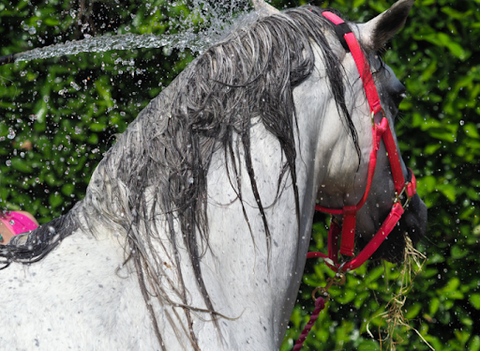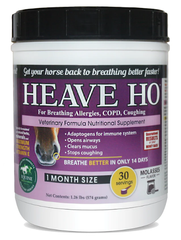Springtime Health Risks for Horses and How to Address Them
As the vibrant hues of spring begin to paint the landscape, horse owners eagerly anticipate spending more time outdoors with their beloved equine companions.
 However, along with the joys of spring come certain health risks that can affect horses. Understanding these risks and taking proactive measures to address them is crucial for ensuring the well-being of our four-legged friends. In this blog post, we'll explore some common springtime health risks for horses and how to manage them effectively.
However, along with the joys of spring come certain health risks that can affect horses. Understanding these risks and taking proactive measures to address them is crucial for ensuring the well-being of our four-legged friends. In this blog post, we'll explore some common springtime health risks for horses and how to manage them effectively. Seasonal Allergies:
Like humans, horses can suffer from seasonal allergies triggered by pollen, dust, and other environmental allergens. Symptoms may include coughing, sneezing, nasal discharge, and skin irritation. To address seasonal allergies in horses, minimizing exposure to allergens is essential, as well as providing clean, dust-free bedding and turning horses out during low pollen counts. Additionally, consulting with a veterinarian for appropriate antihistamine or steroid treatments can help alleviate symptoms and provide relief.
Respiratory Infections:
The changing weather condition s in spring can create an ideal environment for spreading respiratory infections among horses. Close quarters in barns and frequent exposure to other horses at shows or events can increase the risk of infection. Practicing good biosecurity measures, such as regular hand washing and disinfection of shared equipment, can help prevent the spread of respiratory illnesses. Additionally, ensuring horses are up to date on vaccinations, particularly for diseases like influenza and strangles, is essential for protecting their health.
s in spring can create an ideal environment for spreading respiratory infections among horses. Close quarters in barns and frequent exposure to other horses at shows or events can increase the risk of infection. Practicing good biosecurity measures, such as regular hand washing and disinfection of shared equipment, can help prevent the spread of respiratory illnesses. Additionally, ensuring horses are up to date on vaccinations, particularly for diseases like influenza and strangles, is essential for protecting their health.
Digestive Upsets:
Abrupt changes in diet or grazing on lush spring pastures can sometimes lead to digestive upsets in horses. Issues such as colic and laminitis can occur if horses consume large quantities of rich grass or cannot adjust to changes in their diet. To minimize the risk of digestive upsets, horses should be introduced to spring pasture gradually, allowing their digestive systems time to adapt. Monitor their grazing behavior closely and limit access to lush pastures if necessary. Providing ample fresh water and maintaining a consistent feeding schedule can also help support digestive health.
Tick-Borne Diseases:
With the arrival of warmer weather, ticks become more active, posing a threat to horses by transmitting diseases such as Lyme disease and Anaplasmosis. To reduce the risk of tick-borne illnesses, implement a tick control program that includes regular grooming to check for and remove ticks, as well as the use of topical repellents or fly sprays labeled for tick control. Keeping pastures and turnout areas well-maintained, with tall grass and brush cleared, can also help minimize tick habitat.
Parasite Infestations:

Spring is a prime time for parasite infestations in horses, as parasites like strongyles and roundworms thrive in warmer temperatures and moist environments. Implementing a targeted deworming program based on fecal egg counts and rotational deworming protocols recommended by your veterinarian is essential for controlling parasite populations and preventing resistance. Pasture management practices, such as regular manure removal and rotational grazing, can also help reduce parasite exposure.
Skin Conditions:
Wet spring weather and increased sweating during exercise can create ideal conditions for skin conditions such as rain rot and dermatitis in horses. To prevent skin issues, maintain proper grooming practices, including regular bathing and drying off after exercise. Keep horses' living areas clean and dry and provide adequate ventilation to prevent the growth of bacteria and fungi. If skin issues arise, consult a veterinarian for appropriate treatment options.
 Try Heave Ho for seasonal allergies, asthma, and CO.
Try Heave Ho for seasonal allergies, asthma, and CO.

